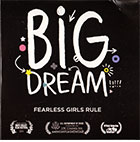
Big Dream 2014
Distributed by Collective Eye Films, 2305 SE Yamhill Street, Suite 101, Portland OR 97214; 503-232-5345
Produced by Iron Way Entertainment
Directed by Kelly Cox
DVD , color, 90 min.
Middle School - General Adult
Computer Science, Documentaries, Education, Technology
Date Entered: 03/02/2016
Reviewed by Brandon West, Social Sciences Librarian, State University of New York at GeneseoThere continues to be an underrepresentation of women in the fields of science, technology, engineering, and mathematics (STEM). This phenomenon is complex and linked to a variety of social, political, and economic forces that dissuade women from pursuing careers, such as computer engineering. Director Cox uses this documentary to highlight the transformative power STEM can have in women's lives.
The film examines the experiences of seven talented, bright, and diverse young women whose journeys intersect with STEM. For example, Martha Chumo is a self-taught programmer from Kenya, who used her talents to start The Dev School. She teaches young people how to “hack” and use technology for solving problems in Africa. Bella Davenport is a college student in San Francisco, who studies computer science and interns for Black Girls Code. She has persevered over economic issues that left her homeless at one point. Mariana Quesada studies networking in Costa Rica, uses her talents to encourage other females to engage with STEM, and earns an internship with NASA. The diversity of the cast helps demonstrate the universality of STEM regardless of a person’s background.
While this film sends a strong message, Director Cox does a great job of not overstating it. She respects the intelligence of the viewers by allowing them to make inferences behind why more women are not involved with STEM. Often, the cast members’ passing comments often reveal insight and raise questions into the complexities of the issues. This make the film excellent for promoting discussion among the different audiences of this film, whether it’s piquing the interest of high school students or engaging a group of college students in a critical dissection of the issues the film brings to light.
The technical quality for this film is impressive. The scenes are shot in clear focus and the cuts are fluid in promoting the narrative. The only place where the film quality dips is when the women film confessionals using consumer-grade technology. These scenes are rare and are not too distracting. The director maintained a fair balance between the stories of the seven different women and the film never holds onto a storyline for too long. At times, it would have been nice to delve more deeply into some of the more interesting storylines, such as Martha Chumo’s work with The Dev School.
Overall, this documentary makes for a great addition to any public or academic library collection. It will appeal to a variety of audiences and disciplines, including education, science, and women’s studies. It is composed of many layers ripe for critical discussions around a very timely and important topic.